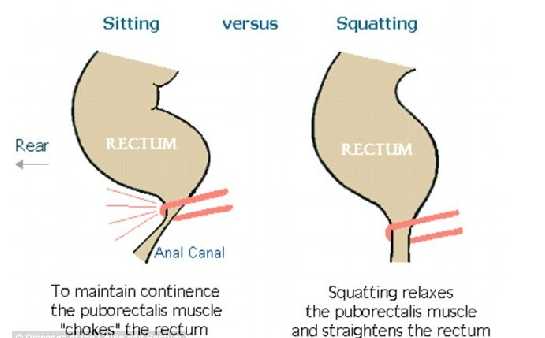(单词翻译:单击)
It's one of the most taboo subjects there is to discuss.
这里讨论的是人人都忌讳的话题。
But one scientist has hauled poo in the limelight - and now everyone's talking about it.
但是,一位科学家将有关便便的话题拉到了公众视野,现在人人都在谈论它。
Giulia Enders, a German microbiologist, claims that people in Western countries are emptying their bowels in totally the wrong way - and instead of sitting on the loo, we should be squatting.
德国微生物学家茱莉亚•恩德斯称,西方国家的人们大便的方式完全错误---大便时不应坐着而应蹲着。

Her book, Charming Bowels, which has topped the charts in her native country for several weeks, explores a number of gut health issues, from constipation to bacteria.
她的《美丽的肠道(Charming Bowels)》一书在德国已经连续几周登顶畅销书榜首,书中探究了便秘和细菌等一系列肠道健康问题。
The overall message is that the gastrointestinal tract is 'the brain's most important adviser', affecting everything from mental to digestive health.
整本书主要传递的信息是,胃肠道是“大脑最重要的顾问”,它影响人的精神和消化道的健康。
But there are also practical gems, such as how to poo properly.
除此之外,书中还探究了一些实用性的问题,比如,如何正确地大便。
Sitting is in fact all wrong, and actually prolongs the process, explains Ms Enders, who is studying in Frankfurt for her medical doctorate in microbiology.
“事实上,坐便是完全错误的方式,它实际上延长了大便的时间,”在法兰克福攻读微生物学博士学位的恩格斯解释道。
It may also explain why haemorrhoids (piles) and painful bowel diseases such as diverticulitis are more common in the West than in Asia, she adds.
她补充说,这也就可以解释为何在西方国家患肠道疾病(比如,憩室炎)以及痔疮的人比亚洲国家多。
She said: '1.2 billion people around the world who squat have almost no incidence of diverticulitis and fewer problems with piles.
她说:“全球12亿蹲便的人中几乎没有人患憩室炎并且也很少有人长痔疮。
'We in the West, on the other hand, squeeze our gut tissue until it comes out of our bottoms.'
“然而,我们西方人坐着挤压肠道组织,直到大便排出。”
Instead, the correct way is to squat.
其实,蹲便反而是正确的方式。
Although you can climb on your toilet seat and squat, the kink can also be ironed out by sitting with your feet on a little stool and leaning forward.
你可以爬上你家的马桶圈上蹲着,不过也可以坐在马桶上,然后给脚下垫一个小凳子,同时保持身体前倾,用这种方式实现蹲便。
Ms Enders adds there is a wealth of research that shows squatting is a more effective way to evacuate the bowels.
恩德斯表示,有大量研究表明蹲便是一种更加有效的排便方式。
This is because the closure mechanism of the gut is not designed to 'open the hatch completely' when we're sitting down or standing up: it's like a kinked hose.
之所以会这样,是因为在我们坐着或站着时,肠道的关闭机制不会“完全开放肠口”,就像一根打了结的软管。
She explained: 'When you sit or stand, there's a muscle that goes around the end of the colon and it pulls, so there's a curve.
她解释道:“在你坐着或站着时,有股力量会游走在结肠的末端,并且产生拉力,最后在结肠末尾会形成一个弯。”
'When we're in a squatting position, and have a little stool in front of the toilet, then the angle is even and straight, so there's less pressure needed.'
“而在我们采取蹲姿,或在马桶前放一个小凳子,双脚踩在凳子上时,肠道的角度就会变平、变直,排便时所需的力就少了。”
'Squatting is far more natural and puts less pressure on our bottoms.'
蹲便是更加自然的姿势,而且对我们的排便器官造成的压力也更小。
Some experts claim we all used to squat - until the middle of the 19th century - and the demise of squatting is to blame for soaring rates of bowel and digestive issues.
一些专家说我们人类过去常常是蹲便的,直到19世纪中期才发生变化,肠道和消化问题的剧增都是因为蹲便的消亡。
As US-based doctor Joseph Mercola writes on his webpage: 'Infants instinctively squat to defecate, as does the majority of the world's population.
美国医生约瑟夫•麦克拉在他的网页上写到:“婴儿本能地蹲着排便,世界上大多数人也是蹲便。”
'But somehow the West was convinced that sitting is more civilized.'
“但是,不知怎么回事,在西方,人们认为坐便更文明。”


